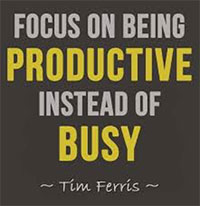I recently discovered a book by Chris Bailey entitled “The Productivity Project: Accomplishing More by Managing Your Time, Attention, and Energy.” It prompted to me to look at my own effectiveness and assess what’s working and where I could improve.
Tips to increase your productivity:

- Rule of Three – Bailey talks about starting each day with the question, “By the time today is done, what three main things do I want to accomplish?” It sounds so simple, but, for me, it’s an effective way to determine what’s important and what’s not. That’s how I start my to-do list.
- Schedule Your Time – Each time we’re interrupted, we lose up to 25 minutes of productivity, according to Bailey. The solution is scheduling. When you set aside time for specific purposes, you’re more effective in using it. For example, have scheduled meeting times with key employees to address issues. I also try to schedule time to check phone and email messages so it doesn’t take away from more important things like writing or reviewing reports.
Simple suggestions for measurable improvement:
- Stop Spinning Your Wheels – When it comes to landing new clients or making sales, focus on the opportunities and put the less-than-ideal ones aside. Qualify your prospects quickly and dispense of those that aren’t a good fit.
- Working Longer Isn’t Working Better – Working more hours doesn’t necessarily increase productivity. However, it’s easy to fall victim to the idea that the more hours we work, the more we will accomplish.While doing research for his book, Bailey worked 90 hours one week and 20 hours the next. He reported feeling more productive during the longer work week, but actually only accomplished a little more than during the shorter week. Why? Because he extended his work to fit how much time he had. Most of us be better at thinking strategically about what we need to do and then expending our energy accordingly. In doing so, we often achieve our goals in a shorter amount of time.
Here’s a final suggestion. To improve productivity, hold more effective meetings. According to Bailey, 37 percent of the average office worker’s time is spent in meetings – and a lot of it isn’t productive. Meetings should start with an agenda that serves as a framework for the time spent together. Items placed on the agenda for convenience, and that can just as easily be handled via an e-mail or a call, should be removed in advance. Such an approach reduces the duration of meetings, making all attendees more productive.
